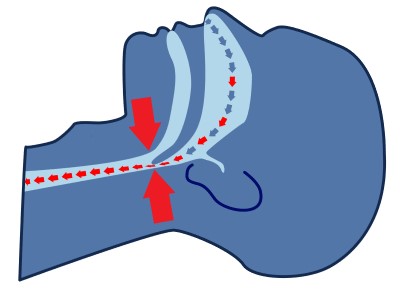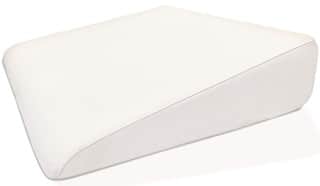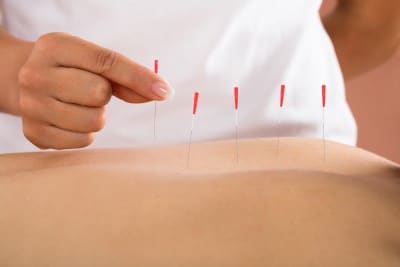
Can sleep apnea cause shoulder pain? – What we know and 17 remedies worth a try
By Jason Wooden, PhD | March 22, 2021
While there’s no direct evidence linking sleep apnea to shoulder pain, it could cause or worsen shoulder pain if: you’re sleeping more on your side, you’re more sensitive to pain because of poor sleep, or your sleep apnea triggers more inflammation in the body.
Depending on your situation, your options include better sleep hygiene, wedge pillows, physical activity, stretching, massage, dietary changes, and seeing a pain specialist.
Sleep apnea and shoulder pain together means twice the misery
Living with sleep apnea is tough enough, especially if you’re still on the road to recovery.
And, let’s be honest, it’s a road with plenty of ups and downs.
Nighttime pain of any sort can make it harder to fall asleep and stay asleep as you toss and turn to get comfortable. It can also keep you out of the deep restorative sleep that’s needed to wake up feeling refreshed.
If you’re up against sleep apnea AND shoulder pain, it can mean double trouble for your sleep.
You’re not the only one in this situation since over half of obstructive sleep apnea patients deal with chronic pain issues. (Chronic pain is any pain that lasts for longer than 12 weeks).
In the US, over 100 million people suffer from chronic pain and 70% of them have sleep issues. Worldwide it’s an issue for an many as one in five adults.
If you’re not careful, you can get into a downward spiral of pain and poor sleep since insomnia can worsen pain.
I remember how much better life got when my sleep apnea was finally under control. And then came shoulder pain issues and it seemed like I was back to square one for a while.
There were nights where it woke me up out of a dead sleep and pain meds only got me so far.
As you get older, you deal with more aches and pain. You’re also more likely to get sleep apnea.
So, it’s understandable if you’re curious about your sleep apnea and shoulder pain.
Let’s take a look at what could be happening and what you can about it.
Other causes besides sleep apnea for shoulder pain
There are many things besides sleep apnea that can cause shoulder pain symptoms.
Your shoulder is made of bones, muscles, ligaments, and tendons.
The most common culprit for shoulder pain is bursitis, also known as rotator cuff tendinitis. (The rotator cuff is a group of muscles and tendons that connects the arm bone to the shoulder blade).
Bursitis happens when the rotator cuff tendons get inflamed or damaged.
Other causes for shoulder pain include:
- arthritis in the shoulder joint
- bone spurs
- broken shoulder bone
- shoulder dislocation
- shoulder separation
- frozen shoulder
- overuse or injuries
- poor shoulder posture and mechanics
And sometimes issues in other parts of the body such as the neck can cause shoulder pain.
This makes it worthwhile to see a doctor even if you suspect your sleep apnea is involved.
Shoulder pain can sometimes be a sign of a heart attack
The American Heart Association recommends you seek immediate medical attention if you also experience:
-chest discomfort
-discomfort in arms, back, neck, or jaw
-shortness of breath
-other signs (cold sweat, nausea, or light headedness)
Can sleep apnea really cause shoulder pain?
Now, we get to what you really want to know – whether there’s a connection between sleep apnea and shoulder pain.
Was sleep apnea the cause of my shoulder issues?
Right now, I think getting older was a factor but years ago I certainly started sleeping way more on the side to help with my snoring and sleep apnea.
(Many people with obstructive sleep apnea are position dependent – switching from sleeping on your back to your side is one of the tricks to help keep the airway more open.)
So, can sleep apnea cause shoulder pain?
There’s no research that shows a direct connection but it’s certainly possible if:
Sleep apnea causes you to sleep more on your side
If it causes you to sleep on your side more than you normally would, that could mean more stress on your shoulder and rotator cuff. That’s what I did because even with CPAP my sleep was better when I stayed on my side.
You’re sleeping more poorly
If your sleep apnea is not under control, you’re not getting deep restful sleep. Poor sleep is thought to increase the body’s sensitivity to pain.
There’s more inflammation in the body
Recent research suggests that obstructive sleep apnea can trigger low grade inflammation throughout the body. The extra inflammation could aggravate any shoulder pain issues you already have.
What to do if you suspect sleep apnea is involved with your shoulder pain
Okay, let’s look at some practical things you can do if you think your sleep apnea may be involved with your shoulder pain.
First, it’s important you do everything you can to keep your sleep apnea under control so it’s not making your pain worse.
The options listed below are for people with the most common type of sleep apnea, obstructive sleep apnea. It happens when the muscles in the throat relax too much during sleep.

Some of the things that can help (if aren’t already doing them) include:
Avoid alcohol in evening – it can relax throat muscles and worsen symptoms
Avoid smoking – it can aggravate and worsen inflammation in the airway
Weight loss – about half of people with sleep apnea are overweight, even a small amount of weight loss can help improve symptoms
Watch your meds – sedatives before bed can relax your throat muscles
Treatment – Make sure you have a sleep apnea treatment that’s doing the job. If you haven’t been diagnosed, get in and see a sleep specialist so you can get a treatment. If you’ve tried CPAP and struck out, don’t give up! They’re now plenty of alternatives you can try.
Secondly, there’s plenty of things worth a try that can help with shoulder pain.
Depending on your situation, it’s likely you’ll have to do multiple things for better results and to deal with specific issues. Lots of things can affect pain including daily habits and lifestyle.
1) Sleep hygiene
I already mentioned the link between poor sleep and pain. The more sleep deprived you get, the more sensitivity to pain.
That makes it important you’re practicing good sleep hygiene, the everyday things that set the stage for quality sleep. Unfortunately, there’s so many things that can affect sleep.
And poor sleep hygiene can sabotage everything else you’re doing to improve your sleep. (What good is it if your sleep apnea treatment is working but you’re up into the wee hours of the morning because you’re drinking too much cola?)

For better sleep hygiene, sleep experts suggest you:
- keep consistent wake up & sleep times
- avoid naps
- exercise during the day
- avoid large meals, alcohol, or stimulants such as caffeine before
- bedtime
- maintain a regular bedtime routine
- avoid using TVs, laptops, or other electronics before sleep
- keep your bedroom dark, cool, quiet, & relaxing
Learn more:
Sleep Hygiene Checklist
3) Rotate sides
Yep, another obvious thing to try. Assuming it’s just one shoulder your dealing with, maybe switching off which side your sleeping on night to night might make the pain more manageable.
If you’re like me with pain in both shoulders, this is a nonstarter. Also, since you’ve likely already tried this, let’s continue on down the list.
4) Watch your posture
Did you know poor posture can cause or worsen shoulder pain? Pay more attention to how you sit, walk, and lift objects.
Also, humans aren’t designed to sit in front of a desk and computer 8 hours a day. If you spend a lot of time in front of a computer, make sure your chair, keyboard, desk, and computer monitor are ergonomically placed.
A physical therapist can help with ergonomics and posture.
Learn more:
Poor posture can cause shoulder pain (Mayo Clinic)
3 Tips to Fix Your Posture to Relieve Neck and Shoulder Pain (Rallyhealth.com)
Office ergonomics: Your how-to guide (Mayo Clinic)
5) Try a wedge pillow instead of sleeping on your side
Recent research suggests that elevating your head slightly can help improve sleep apnea symptoms and sleep quality. So, if you’ve been sleeping on your side because of your sleep apnea or it’s the only way you can get rest, you can switch back to sleeping on your back and give your shoulders a break.


7) Keep the stress down
Stress can cause tension and knots in the shoulder. Also, it can trigger the body’s “fight-or-fight” response leading to more inflammation and pain.
They’re plenty of things that can help with stress including lifestyle changes, meditation, relaxation exercises, gentle stretching, exercise, and counseling.
Learn more:
How Stress and Inflammation Are Linked (Everyday Health)
8) Ice and heat
Ice reduces blood flow to an area which can help reduce inflammation and swelling that cause pain. Heat improves blood flow to an area which can soothe and relax tissues.
9) Pain meds
Your options include:
- over the counter relievers such as acetaminophen (Tylenol) and ibuprofen (Advil).
- prescription painkillers such as codeine, morphine, oxycodone, and Vicodin
- over the counter non-steroidal anti-inflammatory medications (Ibuprofen, Naproxen)
- prescription anti-inflammatory medications
A word of caution:
Popping a pill is a quick and convenient option when dealing with sleep apnea and pain. However, you should keep in mind they come with serious downsides including addiction and various side effects.
Because of this, it’s recommended you weigh the risks with your doctor and use them as a short-term remedy.

11) Stretching
Gentle stretching can help loosen stiff muscles, relieve tension, and improve blood flow.
12) Massage
Massage therapy helps relieve pain through relaxing painful muscles and joints, reducing stress and anxiety, and overriding pain signals.
13) Physical activity
Did you know that a sedentary lifestyle can increase your risk for chronic pain? Contrary to what you may think, studies have found that exercise can help people manage their pain.
Try gentle low impact activities such as walking that won’t aggravate your shoulder injury.
14) Anti-inflammatory diet
Did you know that some of your favorite foods can trigger inflammation in the body and worsen pain?
Anti-inflammatory diets have grown in popularity as a natural way to help the body heal. They focus on avoiding foods shown to increase inflammation and consuming more foods believed to fight inflammation.

Foods to avoid:
- sugary drinks, snacks, and desserts
- refined carbs (white bread, white pasta)
- processed meats and foods
- processed soybean and corn oils
- trans fats
- excessive alcohol
Foods to eat more of:
- fruits and vegetables
- healthy fats (olive oil, coconut oil)
- fatty fish
- nuts
- spices such as turmeric and cinnamon
Learn more:
Anti-Inflammatory Diet 101 (Healthline)
15) Cognitive behavioral therapy
Did you know that pain has biological, psychological, and emotional factors? Psychotherapy can change the way you cope with pain and change the stress response in the brain responsible for the release of chemicals that make pain worse.
Learn more:
How psychologists can help with pain management (American Psychological Association)

17) Music
Studies have shown that music can promote relaxation and help relieve pain. It alleviates anxiety and stress which can contribute to pain.
Learn more:
Music Therapy for Pain Management (Everyday Health)
When dealing with sleep apnea and shoulder pain it’s still worth seeing a doctor
By the way, I’m still dealing with my shoulder pain issues but things are manageable and my sleep apnea is mostly controlled.
I’m using many of the options I listed above and have gotten help from an open-minded pain specialist. Fortunately, my doctor worked with me to figure out what was happening and gave me some things to try that don’t involve surgery.
Based on my experience, it’s well worth seeing a doctor if you’re dealing with ongoing shoulder pain.
What if there’s something more serious than you realize going on? If you’re guessing, you could do the wrong things and make a bad situation worse.
And, if things are really bad, you’ll need a doctor’s prescription for some of the more powerful remedies to get quicker short-term relief.
Also, they can take a look at your shoulder using specialized diagnostics tests. Based on what they find, they will help you come up with a pain management and treatment plan.

The other reason to see a doctor is that there could be other health issues causing problems for your sleep. Most people aren’t aware how many medical conditions are linked to poor sleep
Did you know that arthritis, asthma, chronic pain, cancer, diabetes, and heart disease can cause sleep issues? Anxiety and depression are also linked to poor sleep.
A doctor can check for underlying health issues, other sleep apnea risk factors, and make sure you’re doing the right things to get your sleep back on track.
You may also be interested in:
Sources:
1. Chronic widespread musculoskeletal pain in patients with obstructive sleep apnea syndrome and the relationship between sleep disorder and pain level, quality of life, and disability. J Phys Ther Sci. 2015 Sep; 27(9): 2951–2954.
2. The prevalence and awareness of sleep apnea in patients suffering chronic pain: an assessment using the STOP-Bang sleep apnea questionnaire. Nat Sci Sleep. 2018; 10: 217–224.
3. “27 Chronic Pain Statistics We Need to Know in 2021”, disturbmenot.co
4. “Chronic Pain and Insomnia: Breaking the Cycle”, 2016, Spine-health.com
5. “Shoulder pain”, MedlinePlus
6. “Can Sleeping Positions Cause Shoulder Pain?”, 2018, Chesapeakehand.com
7. The Association of Obstructive Sleep Apnea and Pain Outcomes in Adults: A Systematic Review. Pain Medicine, Volume 19, Issue suppl_1, September 2018, Pages S69–S75.
8. “Obstructive sleep apnea linked to inflammation, organ dysfunction”, 2019, Sciencedaily.com
9. “Research Finds Acupuncture Effective for Chronic Pain”, 2018, American Academy of Family Physicians
Connect with us:
About Us
Better Sleep Simplified® was founded as a place for you to get clear and well-researched information.
Our goal is to make sure you know about your options so that you take action sooner rather than later.
Check us out on YouTube:
Watch and Learn
Helpful sleep tips, interesting sleep facts and statistics you want to know about
Affiliate Disclosure
This site is a participant in the Amazon Services LLC Associates Program and other affiliate advertising programs designed to provide a means for sites to earn advertising fees by advertising and linking to them.
Important: BetterSleepSimplified.com is for informational purposes only and is not intended or implied to be a substitute for professional medical advice, diagnosis, or treatment. Always consult a physician for sleep and health concerns. See additional information.
